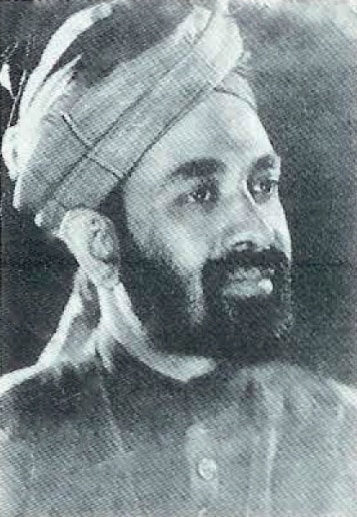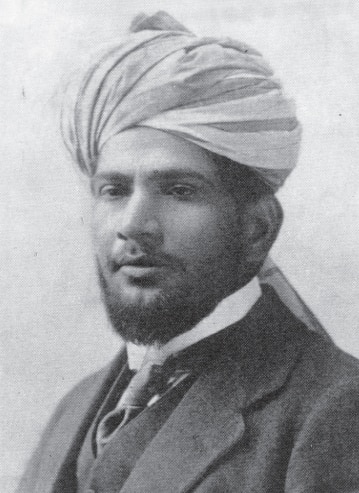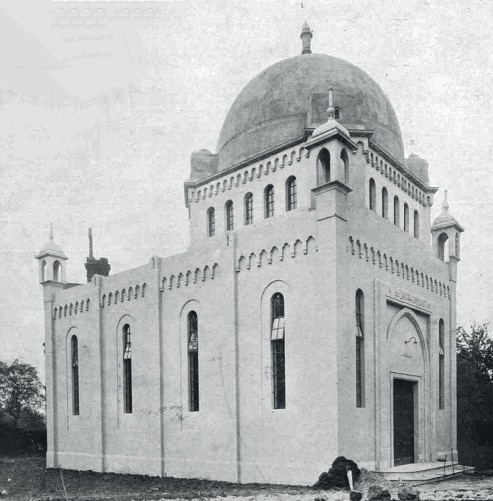Awwab Saad Hayat, Al Hakam
A series looking at pioneer missionaries and devotees of the Ahmadiyya Muslim Jamaat who gave precedence to faith over the world

Introduction
In the Holy Quran, Allah the Almighty states, “Surely, Allah has purchased of the believers their persons and their property in return for the Garden they shall have.” (Surah al-Taubah, Ch.9: V.111)
Promising to make believers abide in a heavenly garden as a result of their sacrifices in the way of Allah, Allah further states:
“Rejoice, then, in your bargain which you have made with Him; and that it is which is the supreme triumph.” (Surah al-Taubah, Ch.9: V.111)
To further illustrate this point, Allah has presented the great examples of Prophets Abrahamas and Ishmaelas in various places of the Holy Quran.
To attain Allah’s support and love, it is incumbent upon those individuals who have sacrificed their lives for the cause of Islam to keep the examples of Prophet Abrahamas and his son, Prophet Ishmaelas, before them. This great lesson of history certainly spells out that if one devotes everything they have for the pleasure of Allah, while rejuvenating their faith in the remembrance of Prophet Abrahamas and offers their life in the same manner, their sacrifice and devotion shall surely be accepted by Allah Almighty.
In the early period of Islam, the Companionsra of the Holy Prophetsa demonstrated the true meaning of waqf (dedication of life for a noble cause) through their actions, feelings, emotions, desires, comfort, wealth and every aspect of human life. And by setting a precedent for every kind of selfless sacrifice, they set an example for future generations.
The concept of waqf in the Ahmadiyya Muslim Jamaat
Thus, in this age of the revival of Islam, in remembrance of the above-mentioned eternal sacrifices, the Promised Messiah, Hazrat Mirza Ghulam Ahmadas restarted the scheme of waqf. Everything Hazrat Ahmadas did was based on Allah’s desire. His zeal to spread Islam and defend it as superior over all religions was unparalleled in the last 1300 years. He devoted all he had to the cause of Islam. This is the spirit Hazrat Ahmadas wished to establish within the members of his Jamaat.
In September 1907, the Promised Messiahas initiated a scheme for life-devotees (Badr, 3 October 1907) and on this occasion, instructed Hazrat Mufti Muhammad Sadiqra to make a list of people who had dedicated their lives. Therefore, a register was made for this purpose in which the names of the Companions who offered their lives for this noble cause were recorded.
After the demise of the Promised Messiahas, his khulafa, in their respective times, carried forward this great system of life dedication in the form of various schemes. Thus, through schemes such as Waqf-e-Zindagi, Waqf-e-Aulad (waqf of one’s offspring), Waqf Baad Az Retirement (waqf after retirement), Waqf-e-Arzi and Waqf-e-Nau, members of the Jamaat were – as they are today – able to serve in various capacities. While the youth of the Jamaat offered themselves for the service of religion, parents also responded to these schemes and offered their children for this noble cause. Similarly, older people, with their experience, came to the service of the Jamaat after retirement. People from different walks of life were able to go to different departments during the holidays and serve as temporary devotees, and this practice has continued to this day. Around 75,522 fortunate souls, from all over the world, have joined the Waqf-e-Nau scheme, alone. (Al Hakam, Ahmadiyyat continues to progress: Huzoor delivers the second-day address at Jalsa Salana UK 2021)
Let us now reflect on some pertinent questions, such as, what is waqf? What are its requirements? What are the things to keep in mind when making this decision?
In this regard, the Promised Messiahas states:
“True Islam is to dedicate all of one’s energy and strength in the way of Allah for the rest of one’s life so that one may inherit a pure life. Therefore, God Almighty points to this divine endowment [in the following verse]:
مَنْ أَسْلَمَ وَجْهَهُ لِلّٰهِ وَهُوَ مُحْسِنٌ فَلَهُ أَجْرُهُ عِنْدَ رَبِّهِ وَلَا خَوْفٌ عَلَيْهِمْ وَلَا هُمْ يَحْزَنُوْنَ
“[‘Whoever submits himself completely to Allah, and is the doer of good, shall have his reward with his Lord. No fear shall come upon such, neither (shall they) grieve’]. The meaning of أَسْلَمَ in this place is that one falls at the threshold of the Divine, shrouded by the garment of humility and meekness; and should dedicate his life, wealth, and honour for Allah and make the world, and all its elements, a servant of religion.” (Al Hakam, 16 August 1900)
Hazrat Khalifatul Masih Ira, whilst stating how Allah accepts the sacrifice of His servant and how He makes this sacrifice fruitful, wrote:
“Whosoever sacrifices [his life in Allah’s cause], Allah bestows special grace on him. Allah becomes his guardian.” (Badr, 21 January 1909)
Hazrat Khalifatul Masih IIra, while initiating the call to devote one’s entire life, states:
“The current condition of Islam demands that an entire lifetime is dedicated for it – and there should be many who dedicate their lives. This is such a time where, currently, to serve in a small capacity shall be of greater reward than to give huge services at a later time. Islam is being effaced. Therefore, a little service of those who aid at this time shall be of greater value.” (Friday Sermon, 20 September 1918, published in Al Fazl, 1 October 1918, p. 5)
The instructions and advice of the khulafa of the Promised Messiahas are worthy of being written and remembered because it is through their words and advice that life-devotees are equipped with spiritual alms to aid them. For example, Hazrat Musleh-e-Maudra, through his various speeches and addresses, instilled within missionaries the spirit of determination and taught them to work in every field and to face every challenge with purpose and high spirits. The advice given by Hazrat Musleh-e-Maudra to Hazrat Maulvi Muhammad Dinra, on his departure for the United States, included:
“The one who is disappointed never succeeds; the one who contemplates his future endeavours, even while [his neck is] under the sword, succeeds.” (Al Fazl, 25 January 1923)
The khulafa, while striving for the intellectual advancement of early life-devotees, also took steps to show the world the greatness of the sacrifices of life-devotees. For example, in October 1946, when Maulvi Rashid Ahmad Chughtai Sahib was about to leave for Palestine as a missionary, he requested Hazrat Musleh-e-Maudra to visit his home in Qadian. Thus, despite his frail health at the time, Huzoorra fulfilled his request by visiting his house and leading a silent prayer.
New series in Al Hakam
In this series, we endeavour to provide a brief overview of the sacrifices and works of over 200 well-known servants of the Jamaat who dedicated their lives and performed their duty of preaching Islam Ahmadiyyat to the corners of the Earth. Among them were fortunate personalities who endured the hardships of imprisonment for this noble cause and returned victorious from the jihad of preaching. Some sacrificed their lives and attained the status of martyrdom. These soldiers of Islam were given this victory by the grace of God Almighty; however, the Ahmadiyya Khilafat played a huge role in instilling this spirit of sacrifice. The khulafa carried out this mission with great efficiency and diligence on the solid foundations which the Promised Messiahas installed. Their efforts launched a network of tabligh centres all over the world and started a revolution in favour of Islam, causing those who opposed and attacked Islam to flee.
After a series of failures, Christian missions in some African countries were forced to stop preaching. Due to the efforts of Jamaat-e-Ahmadiyya, the doctrine of the Trinity began to fade. This is a fact that is acknowledged by even non-Muslims. The Muslim world will always be indebted to the Khulafa-e-Ahmadiyyat for carrying out this universal spiritual revolution.
Let us now look at some of the sacrifices of these early missionaries:
Hazrat Sufi Muti-ur-Rahman was born in East Bengal. When he accepted Ahmadiyyat at the age of 15, his father ousted him from his home. Sufi Muti-ur-Rahman Sahib then came to Qadian and, under the instruction and guidance of Hazrat Mulseh-e-Maudra, began studying at Islamia College Lahore. Later, his father also accepted Ahmadiyyat and went to Qadian. After completing his BA, Sufi Muti-ur-Rahman Sahib was appointed as the headmaster in a village named Ghatyalian (now in district Sialkot, Pakistan). During this time, he completed his MA and dedicated his life to the service of Islam.

In 1928, he was appointed as a missionary in the United States, where he served until 1948. There, he also wrote a few books and served as the editor of The Review of Religions.
Regarding Sufi Muti-ur-Rahman Sahib, Syed Ahmad Ali Shah Sahib, who was the then missionary-in-charge of Karachi, said that when Sufi Muti-ur-Rahman Sahib returned home after serving for 12 years in the United States as a preacher, his son, Lutf-ur-Rahman, and other members of the Jamaat arrived at the Karachi airport to receive him. Syed Ahmad Ali Shah Sahib stated that he noticed that Sufi Sahib did not speak to his son. Syed Ahmad Ali Shah Sahib asked, “Do you know this boy?” Sufi Muti-ur-Rahman Sahib replied in the negative.
Syed Ahmad Ali Shah Sahib narrated that his eyes welled up and he became very emotional. He said that due to his eyes filling with tears, he could barely point out to tell him that the young boy, Lutf-ur-Rahman, was in-fact Sufi Muti-ur-Rahman Sahib’s son. The young Lutf-ur-Rahman remained silent. Sufi Sahib got up, with tears flowing from his eyes, and immediately embraced his son. (Al Fazl Rabwah, 24 February 2005, p. 4)
Having spent 12 years serving Islam in another country far away from his family, Sufi Muti-ur-Rahman Sahib, upon arrival, was unable to recognise his son who had then become a young adult.
These resilient life-devotees were thousands of miles away from their loved ones and families. These men of God fulfilled the duty of preaching Ahmadiyyat to the corners of the Earth.
The first missionary of the Ahmadiyya Jamaat to Europe, Hazrat Chaudhry Fateh Muhammad Sayalra, after completing his studies and attaining his degree, was fortunate enough to be appointed as a missionary to England in June 1913. He established the first Ahmadiyya mission in Europe. He will forever be remembered as the first missionary of England.

Flicking through the pages of history, we read that in addition to the unfamiliar environment, severe weather and different diet, Hazrat Chaudhry Fateh Muhammad Sayalra faced strange obstacles and even opposition in his preaching activities.
Khawaja Kamal-ud-Din Sahib, who was already present in London, sent a request to Hazrat Khalifatul Masih Ira to send a missionary to London. Therefore, on the call of Hazrat Khalifatul Masih Ira, Hazrat Chaudhry Fateh Muhammad Sayalra offered his name for this great cause which was graciously accepted by Hazrat Khalifatul Masih Ira.
Hazrat Chaudhry Muhammad Zafrulla Khanra states that when Hazrat Chaudhry Fateh Muhammad Sayalra visited London, he printed and distributed a pamphlet entitled Wafat-e-Hazrat Isaas (The Death of Prophet Jesusas). When Khawaja Kamaluddin Sahib found out about this, he asked him why he had published this pamphlet and stated that it was a means of causing disruption and commotion as the very basis and foundation of Christianity was in the belief of Jesus’ ascension. After listening to what Khawaja Kamaluddin Sahib had to say, Hazrat Chaudhry Fateh Muhammad Sayalra replied that if he could not prove the death of Prophet Jesusas, then what was the point of his coming to London?
Hazrat Chaudhry Fateh Muhammad Sayalra adopted various methods of preaching in London. He stated that he used to go to Hyde Park in London and preached daily at Speakers’ Corner – a place dedicated to public speaking and frequented by the likes of Karl Marx, Vladimir Lenin and George Orwell. Various people would come and listen to the message of Hazrat Chaudhry Fateh Muhammad Sayalra.
What is remarkable is that Hazrat Chaudhry Fateh Muhammad Sayalra had the courage to preach the truth whilst sitting in the heart of the British Empire. It should be remembered that at that time, a significant part of the world, including the Indian subcontinent, was under British rule and in such a time, a person from one of its subjugated regions, who abided by his religion, traditional style of attire, beard and appearance, was not influenced in the slightest by the European life and remained devoted to preaching the true teachings of Islam.
In April 1918, he returned to India. He visited London again in 1919 and stayed there till May 1921. During this time, under the guidance of Hazrat Musleh-e-Maudra, he also acquired a plot of land, where the Fazl Mosque, London is located today.

Compared to Muslim states, organisations and institutions that possess wealth, political and social influence, the purchase of a plot of land in London, which would later serve as the residence of Khilafat for three and a half decades (1984 to 2019), by a humble missionary of the Jamaat is nothing short of remarkable.
Hazrat Musleh-e-Maudra was residing in Dharamshala, a city in the Indian state of Himachal Pradesh, when he received the good news of land being purchased in London. Upon this joyous occasion, he held a simple ceremony expressing his gratitude towards Allah. In this ceremony, all those accompanying Huzoorra on the journey – such as Hazrat Mirza Bashir Ahmadra MA, Hazrat Mirza Sharif Ahmadra, Hazrat Mir Muhammad Ismailra, Hazrat Maulvi Abdur Rahim Dardra, Hazrat Dr Hashmatullah Khanra – took turns to read out poems about the mosque in London which was to be built. After everyone had recited their odes, Hazrat Musleh-e-Maudra recited the following couplets from his poem:
مركزِ شرک سے آوازهٔ توحيد اٹها
ديكهنا ديكهنا، مغرب سے ہے خورشيد اٹها
نور كے سامنے ظلمت بهلا كيا ٹهہرے گی
جان لو جلد هی اب ظلمِ صناديد اٹها
“A call to God’s unity has been made from the centre of polytheism; watch as the sun rises from the West.
“How can darkness prevail before light? The tyranny of old gods is now to see its end.”
The poems were followed by the Asr prayer. After salat, dinner was presented and many were invited for this joyous occasion where praise and gratitude was offered to Allah for granting this victory. This was a step closer to the propagation of Islam to the Western audience and opening the doors to the fulfilment of the Holy Prophet’ssa words with regard to the Latter Days, “The sun shall rise from the West”.

